初中英语语法(英语不定代词)
【初中英语】初中英语不定代词语法大全

【初中英语】初中英语不定代词语法大全【—不定代词】在英语中有哪些不定代词及不定代词的功能与用法分别又是什么?下文老师为大家带来具体介绍。
3.12 不定代词1)不定代词有all , both, every, each, either, neither, more, little, few, much, many, another, other, some, any , one, no 以及some, something, anything, everything, somebody, someone, anybody, anyone, nothing , nobody, no one, none, everybody, everyone.等。
2)不定代词的功能与用法a. 除every 和no外不定代词既可用作名词,也可用作形容词。
every和no在句中只能作定语。
I have no idea about it.b. all 都,指三者以上。
all 的主谓一致:all的单复数由它所修饰或指代的名词的单复数决定。
All goes well. 一切进展得很好。
all 通常不与可数名词单数连用,如:不说 all the book,而说 the whole book。
但all可与表时间的可数名词单数连用,如 all day,all night,all the year;但习惯上不说 all hour,all century。
all还可以与一些特殊的单数名词连用,如 all China,all the city,all my life, all the way3) both 都,指两者。
a. both 与复数动词连用,但both… and…可与单数名词连用。
b. both, all 都可作同位语,其位置在行为动词前, be 动词之后。
如果助动词或情态动词后面的实义动词省去,则位于助动词或情态动词之前。
Who can speak Japanese? We both (all) can.4) neither 两者都不a. neither作主语时,谓语动词用单数。
初中不定代词讲解及练习

不指名代替任何特定名词或形容词的代词叫做不定代词。
常见的不定代词有 all, each, both, either, neither, one, none, little, few, many, much, other, another,等,以及由 some, any, mething 等)。
some, any, no, (a) few, (a) little, both, enough, every no 和 every 构成的合成代词(即 somebody, someone, so有些不定代词用于指两者 (如 both, either, neither)有的不定代词用于指三者 (如 all, any, none, every)Both of my parents are doctors. 我的父母都是医生。
All of the students are interested in it. 所有的学生对此都很感兴趣。
There are trees on any side of the square. 广场的每一边都种有树。
He has two sons, neither of whom is rich. 他有两个儿子,都不富有。
He has three sons, none of whom is rich. 他有三个儿子,都不富有。
each 可用于两者、三者或三者以上,而 every 只用于三者或三者以上,因此用于两者时只能用 each ,不能用 every 。
如:不能说 There are trees on every side of the road.复合不定代词包括 something, somebody, someone, anything, anybody, any one, nothing, nobody, no one, everything, everybody, everyone 等。
初中英语语法一轮复习之不定代词用法辨析

2024届初中英语语法一轮复习之不定代词用法辨析1. 概说不定代词是语法术语,在句中可以作主语、宾语、表语、定语和状语。
不定代词是不指明代替任何特定名词或形容词的代词。
常用的不定代词有:some(something,somebody,someone),any(anything,anybody, anyone),no(nothing,nobody,noone),all,each,both,much,many,(a)little,(a)few,other(s),an other,none,one,either,neither等。
修饰不定代词的词要置于其后。
不定代词还可以由body,one,thing构成的合成代词,如somebody,anybody,everybody,nobody,someone,anyone,everyone ,no one,something,anything,everything,nothing等。
做主语时谓语动词用第三人称单数。
2. some与anysome和any都是不定代词,都可用于表示“一些”或“任何一个”的意思。
它们的区别在于:some表示“一些”,通常用于肯定句中,any则表示“任何一个”,通常用于否定句或疑问句中。
some的语气比any更肯定,any表示不确定,有“或许”、“也许”的意味。
some可以用作主语、宾语、表语、定语和状语,而any只能用作主语、宾语、表语和定语。
例如:Some water has leaked out of the pipe.(管道里有一些地方漏水了。
)Any water has leaked out of the pipe?(管道里有没有水泄漏?)I want to buy some apples(我想买一些苹果。
)Are any apples ripe yet?(有哪些苹果熟了?)3. many与muchmany和much都是不定代词,都可用于表示“许多”或“相当多”的意思。
初中英语语法不定代词讲解及习题

初中英语语法不定代词讲解及习题不定代词一、不定代词概述定义不指明代替任何特定名词或形容词的代词some 类something, somebody, someone any 类no 类every 类常见不定代词其他all, each, both, none, one, much, many, (a)few, (a)little, either, neither, other, another 不定代词充当成分作主语、宾语、表语、定语等二、常见不定代词的基本用法1、some 和any: 都是“一些”的意思,都可与可数名词复数或不可数名词连用。
(1)some 一般用于肯定句中,any 一般用于否定句或疑问句中。
Eg. ___________________________________________________________ ___________________________________________________________(2)在表示请求、建议或希望得到肯定回答的疑问句中,应该用some 而不用any 。
Eg. Would you please give me some paper?___________________________________________________________(3)当any 表示“任何”或“无论哪一个”的意义时,可以用于肯定句,此时any 要重读。
Eg. You may come at any time that is convenient to you.___________________________________________________________2、表示数量的不定代词(1)many______, few_______, a few_______, 用以代替或修饰可数名词。
(2)much______, little_______, a little________,用以代替或修饰不可数名词。
【初中英语语法总复习】初中英语常见不定代词的用法辨析
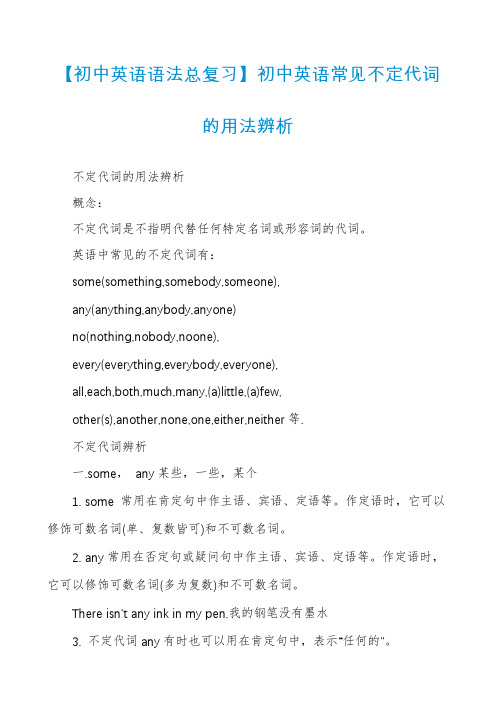
【初中英语语法总复习】初中英语常见不定代词的用法辨析不定代词的用法辨析概念:不定代词是不指明代替任何特定名词或形容词的代词。
英语中常见的不定代词有:some(something,somebody,someone),any(anything,anybody,anyone)no(nothing,nobody,noone),every(everything,everybody,everyone),all,each,both,much,many,(a)little,(a)few,other(s),another,none,one,either,neither等.不定代词辨析一.some,any某些,一些,某个1. some 常用在肯定句中作主语、宾语、定语等。
作定语时,它可以修饰可数名词(单、复数皆可)和不可数名词。
2. any常用在否定句或疑问句中作主语、宾语、定语等。
作定语时,它可以修饰可数名词(多为复数)和不可数名词。
There isn’t any ink in my pen.我的钢笔没有墨水3. 不定代词any有时也可以用在肯定句中,表示“任何的"。
you may e at any time.你任何时候来都行.4. some 用于疑问句时,表示建议、请求或希望得到肯定回答。
如:Would you like some coffee with sugar?(你要加糖的咖啡吗?)二.little, few1. a few /few +名词复数,a little /little +不可数名词,afew /a little 表肯定,(一点/一些),few / little 表否定(几乎没有) a little salt/little salt一点盐/没有多少盐a few people/few people有几个人/没有几个人2. a little +不可数名词= a bit of + 不可数名词,译为“一点”alittle +形容词=abit +形容词,译为“有点”a little water= a bit of water 一点水a little tired = a bit tired 有点累三.表许多1. alot of与lotsof同义,其后可以接可数名词复数或不可数名词2. many之后只能接可数名词复数3. Much之后只能接不可数名词四.both, all1. both两者都2. all三者或以上都五.either,neither,none1. either二者中任意一个2. neither两者都不3. none三者或以上都不六.any, every1.any 指任何一个,强调部分.2.every 指每一个,强调整体.七.each,every1. each 两者以上中每一个,可以做主语,宾语和定语,可以和of 连用。
初中英语语法——不定代词
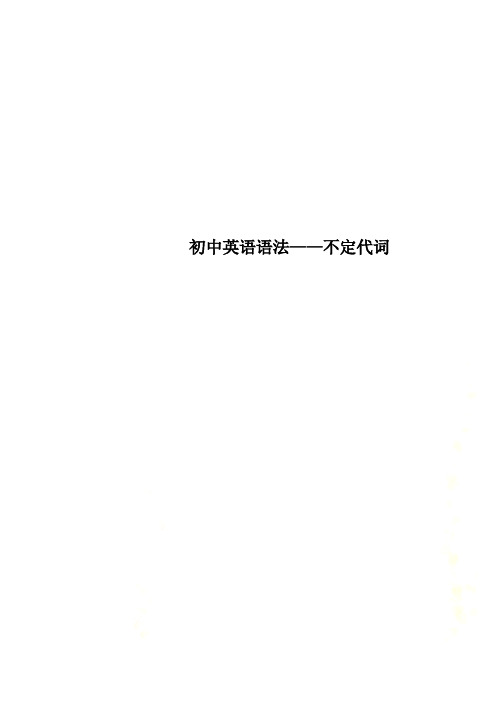
初中英语语法——不定代词初中英语语法——不定代词不明确指代某个人,某个事物,某些人,某些事物的代词叫做不定代词。
不定代词用法比较复杂,在掌握各个不定代词的用法时有必要把意义相近,用法不同的不定代词进行比较。
不定代词分为两大类,即普通不定代词和复合不定代词。
不定代词基本用法all some any (1) 用作形容词,其后跟不可数名词和复数可数名词。
(2) 用作代词,可单独使用,也可跟“of+不可数名词和复数可数名词”。
both (a)few many(1) 用作形容词,其后跟复数可数名词。
(2) 用作代词,其后可跟“of+复数可数名词”,也可单用。
(a)little much (1) 用作形容词,其后跟复数可数名词。
(2) 用作代词,其后可跟“of+复数可数名词”,也可单用。
each either neither (1) 用作形容词,其后可跟单数可数名词。
(2) 用作代词,其后可跟“of+复数名词”,也可单用。
出题点: (1) some和any的用法(2) many和much的用法(3) few, a few, little, a little的用法(4) one, it和that的用法区别(5) other(s)和the other(s)的用法区别(6) none, no one, neither, either的用法区(1) all和both都意为“都”。
all指三者或三者以上的人或物; both则指两个人或物。
They were only two paintings for sale and he bought both.We should protect the beautiful flowers on both sides of the street.All of them have now become writers.All was quiet in the street outside.Both men and women are not of the same character.(2) all, both作主语的同位语时,应位于实义动词之前,系动词、助动词或情态动词之后。
初中常用不定代词用法

初中常用不定代词用法 -CAL-FENGHAI-(2020YEAR-YICAI)_JINGBIAN初中常用不定代词用法不指明代替任何特定名词或形容词的代词叫做不定代词。
常用不定代词有:some,any,all ,none,both,either,neither,each, every,other,another,much,many,few,little,one等。
一、不定代词的用法不定代词大都可以代替名词和形容词,在句中作主语、宾语、表语和定语。
1.作主语Both of them are teachers.他们两人都是教师。
2.作宾语I know nothing about this person.我对这个人一无所知。
3.作表语This book is too much for a child.这本书对一个小孩来说太难了。
4.作定语There is a little water in the glass.玻璃杯里有一些水。
二、常用不定代词用法举例1.some 一些,某些,某个不定代词some可以代替名词和形容词,常用在肯定句中作主语、宾语、定语等。
作定语时,它可以修饰可数名词(单、复数皆可)和不可数名词。
例如:Some are doctors,some are nurses.有些人是医生,有些人是护士。
(作主语)2.any一些,任何不定代词any可以代替名词和形容词,常用在否定句或疑问句中作主语、宾语、定语等。
作定语时,它可以修饰可数名词(多为复数)和不可数名词。
例如:There isn’t any ink in my pen.我的钢笔没有墨水。
(作定语)不定代词any有时也可以用在肯定句中,表示"任何的"。
例如:You may come at any time;I’ll be home the whole day.你任何时候来都行,我整天都将呆在家里。
不定代词any也可以用作副词,做状语,表示程度。
七年级上册英语不定代词

七年级上册英语不定代词不定代词是指代替某种人或东西的代词,例如:somebody,something,anybody,anything等等。
这些词可以在句子中作主语、宾语、表语或定语,具体用法如下:1. 不定代词作主语当不定代词作主语时,谓语动词要用单数形式。
例如:- Anything is possible if you work hard.2. 不定代词作宾语当不定代词作宾语时,谓语动词的单复数要根据宾语而定。
例如:- I want to buy something for my mom.(something作buy的宾语)- Does anybody know the answer to this question?(anybody作know的宾语)3. 不定代词作表语当不定代词作表语时,要用it作形式主语。
例如:- It's important to do something for the environment.- It's hard to find anything interesting on TV these days.4. 不定代词作定语当不定代词作定语时,一般放在被修饰的名词之前。
例如:- He doesn't have anything to say.(anything作宾语)- Is there anyone who can help me?(anyone作主语)通过以上对不定代词的介绍,相信大家已经掌握了不定代词的用法。
在平时的英语学习和日常交流中,要多加练习,才能更好地掌握它们的用法,用好它们,提高自己的语言表达水平。
不定代词知识点详解(初中英语专题复习)2

其他。必须单独使用,泛指别人或别的东西,常用于"some... others"结构
Some are red, and others are black. 一些是红的,另一些是黑的。
the other
两个中的另一个,剩下的一个。特指,常用于"one... the other..."结构
She has two sisters — one is a nurse, and the other is a teacher. 她有两个姐姐,一个是护士,另一个是老师。
易错警示:
every day与everyday的区别:
1. every day是名词短语,在句中充当状语,修饰整个句子。
I finish my homework before everyday是形容词,在句中充当定语,修饰名词。
Everyday work makes me bored. 每天的工作让我很烦。
②either作主语时,谓语动词应使用单数形式;作定语时,修饰单数名词。
You can park on either side of the street. 你在街道的哪边停车都可以。
The two guests have arrived and either is welcome. 两个客人都到了,而且都受欢迎。
知识拓展:both作主语时,谓语动词使用复数形式;作主语的同位语时,位于be动词、助动词之后,行为动词之前。
Both of them have been to Beijing. 他们两人都去过北京。
They all enjoyed it. 他们都喜欢它。
none
①意为"没有人,没有一个,一点儿也没有,作主语和宾语,不作定语;
初中英语知识点:不定代词
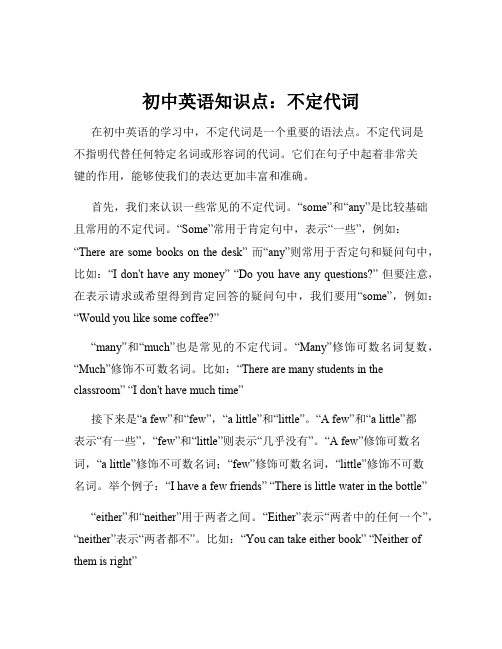
初中英语知识点:不定代词在初中英语的学习中,不定代词是一个重要的语法点。
不定代词是不指明代替任何特定名词或形容词的代词。
它们在句子中起着非常关键的作用,能够使我们的表达更加丰富和准确。
首先,我们来认识一些常见的不定代词。
“some”和“any”是比较基础且常用的不定代词。
“Some”常用于肯定句中,表示“一些”,例如:“There are some books on the desk” 而“any”则常用于否定句和疑问句中,比如:“I don't have any money” “Do you have any questions?” 但要注意,在表示请求或希望得到肯定回答的疑问句中,我们要用“some”,例如:“Would you like some coffee?”“many”和“much”也是常见的不定代词。
“Many”修饰可数名词复数,“Much”修饰不可数名词。
比如:“There are many students in the classroom” “I don't have much time”接下来是“a few”和“few”,“a little”和“little”。
“A few”和“a little”都表示“有一些”,“few”和“little”则表示“几乎没有”。
“A few”修饰可数名词,“a little”修饰不可数名词;“few”修饰可数名词,“little”修饰不可数名词。
举个例子:“I have a few friends” “There is little water in the bottle”“either”和“neither”用于两者之间。
“Either”表示“两者中的任何一个”,“neither”表示“两者都不”。
比如:“You can take either book” “Neither of them is right”“both”表示“两者都”,“all”表示“三者或三者以上都”。
(完整)初中英语语法不定代词讲义.doc
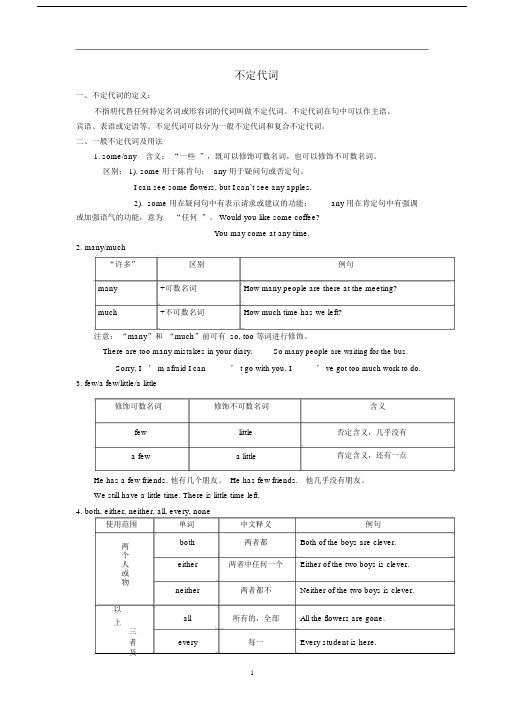
不定代词一、不定代词的定义:不指明代替任何特定名词或形容词的代词叫做不定代词。
不定代词在句中可以作主语、宾语、表语或定语等。
不定代词可以分为一般不定代词和复合不定代词。
二、一般不定代词及用法1.some/any 含义:“一些”,既可以修饰可数名词,也可以修饰不可数名词。
区别: 1). some 用于陈肯句; any 用于疑问句或否定句。
I can see some flowers, but I can`t see any apples.2). some 用在疑问句中有表示请求或建议的功能;any 用在肯定句中有强调或加强语气的功能,意为“任何”。
Would you like some coffee?You may come at any time.2. many/much“许多”区别例句many+可数名词How many people are there at the meeting?much+不可数名词How much time has we left?注意:“many”和“much”前可有 so, too 等词进行修饰。
There are too many mistakes in your diary.So many people are waiting for the bus.Sorry, I ’ m afraid I can ’ t go with you. I ’ ve got too much work to do.3. few/a few/little/a little修饰可数名词修饰不可数名词含义few little 否定含义,几乎没有a few a little 肯定含义,还有一点He has a few friends. 他有几个朋友。
He has few friends. 他几乎没有朋友。
We still have a little time. There is little time left.4. both, either, neither, all, every, none使用范围单词中文释义例句两both 两者都Both of the boys are clever.个人either 两者中任何一个Either of the two boys is clever.或物neither 两者都不Neither of the two boys is clever.以all 所有的,全部All the flowers are gone.上三者every 每一Every student is here.及none都不I like none of the flowers.5.“ other、”“another、”“others和”“the others”易混淆范含other泛指其他的the other(one⋯,the other⋯) = 2 另一个another ≥ 3 另一个others = other+ 名复数剩余非全部其他的the others 剩余全部其他的I have two pencils. One is yellow, the other is red.I don’ t like this green pencil, please give me another one.In our class, some students like playing football, others like playing basketball.There are seven people in Running Man. One is a woman, and the others are men.三、复合不定代及用法1. 复合不定代的构成:复合不定代是由some-,any-,no-,every- 加上 -one,-body ,-thing 所成的不定代。
初中英语8个不定代词

初中英语8个不定代词
不定代词通常指的是一类用于替代不确定或泛指人或事物的词汇。
1 Somebody / Someone:
用法:指代不特定的人。
例句:Somebody is waiting for you at the door.
2 Something:
用法:指代不特定的事物。
例句:I heard something strange in the backyard.
3 Anybody / Anyone:
用法:用于疑问句或否定句,指代任何一个人。
例句:Has anyone seen my keys?
4 Anything:
用法:指代任何事物。
例句:You can ask me anything you want.
5 Everybody / Everyone:
用法:指代所有人,强调每个人。
例句:Everyone is invited to the party.
6 Everything:
用法:指代所有事物,强调每件事物。
例句:She has to finish everything before leaving.
7 Nobody / No one:
用法:指代没有任何人。
例句:Nobody knows the answer to that question.
8 Nothing:
用法:指代没有任何事物。
例句:There is nothing in the fridge.。
初中英语代词知识点:不定代词句中的用法
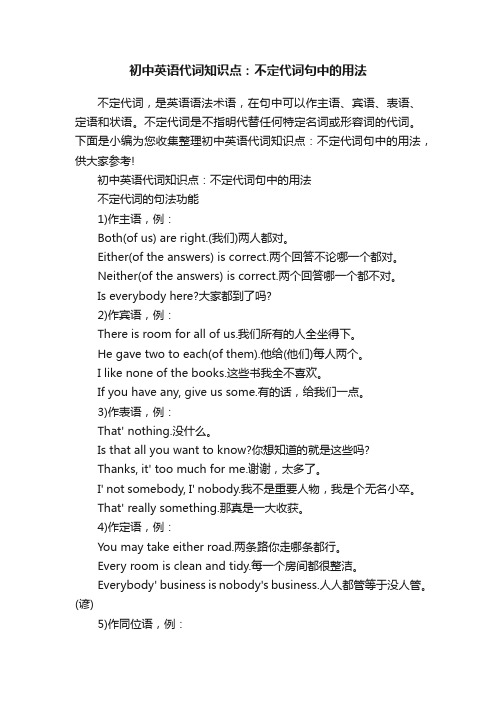
初中英语代词知识点:不定代词句中的用法不定代词,是英语语法术语,在句中可以作主语、宾语、表语、定语和状语。
不定代词是不指明代替任何特定名词或形容词的代词。
下面是小编为您收集整理初中英语代词知识点:不定代词句中的用法,供大家参考!初中英语代词知识点:不定代词句中的用法不定代词的句法功能1)作主语,例:Both(of us) are right.(我们)两人都对。
Either(of the answers) is correct.两个回答不论哪一个都对。
Neither(of the answers) is correct.两个回答哪一个都不对。
Is everybody here?大家都到了吗?2)作宾语,例:There is room for all of us.我们所有的人全坐得下。
He gave two to each(of them).他给(他们)每人两个。
I like none of the books.这些书我全不喜欢。
If you have any, give us some.有的话,给我们一点。
3)作表语,例:That' nothing.没什么。
Is that all you want to know?你想知道的就是这些吗?Thanks, it' too much for me.谢谢,太多了。
I' not somebody, I' nobody.我不是重要人物,我是个无名小卒。
That' really something.那真是一大收获。
4)作定语,例:You may take either road.两条路你走哪条都行。
Every room is clean and tidy.每一个房间都很整洁。
Everybody' business is nobody's business.人人都管等于没人管。
(谚)5)作同位语,例:They both agreed to stay here.他们两人都答应待在这儿。
初中英语语法专题——不定代词(中考必考)

初中英语语法专题——不定代词1.常见的复合不定代词有:2.不定代词的用法:(1)some 和any 既可代替或修饰可数名词复数,也可代替或修饰不可数名词。
some多用于肯定句,any则多用于否定句,疑问句和条件从句。
any也可以用于肯定句,后接单数可数名词,表示“任何一个……”;后接复数名词,表示“任何的……”(并不强调单个的个体)。
例:You can get it at any shop. 你可以在任何一家商店买到它。
The people will report to you before making any major decisions.这些人在作出任何重大决定前都会向你报告。
但是,在Would you like some tea? 这类问句中则用some,而不用any,这是因为问话者希望得到对方肯定的答复。
(2)many 和much均表示“很多”。
但many 只可代替或修饰可数名词复数,而much只代替或修饰不可数名词。
(3)few 和a few 是一对反义词,代替或修饰可数名词复数;little与a little 也是一对反义词,代替或修饰不可数名词。
few和little 的意思是很少,几乎没有,侧重否定的含义;a few 和a little 的意思是有一些,侧重肯定的含义。
(4)除no one 以外,其他复合不定代词都写成一个词。
(5)不定代词如果有形容词修饰,该形容词置于其后。
例:something interesting 有趣的事情nothing special 没什么特别的(6)由some, any, no , every构成的复合不定代词作主语时,都作单数看待,谓语动词用第三人称单数形式。
例:Someone is waiting for you outside. 某个人正在外面等你。
初中英语知识点:不定代词
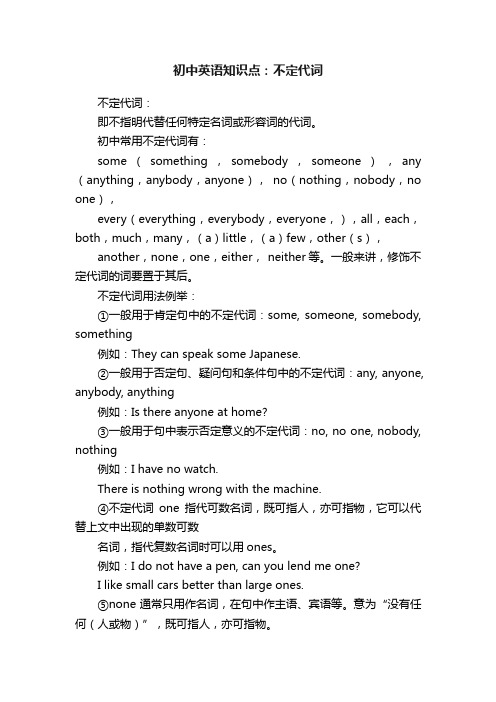
初中英语知识点:不定代词不定代词:即不指明代替任何特定名词或形容词的代词。
初中常用不定代词有:some(something,somebody,someone),any (anything,anybody,anyone),no(nothing,nobody,no one),every(everything,everybody,everyone,),all,each,both,much,many,(a)little,(a)few,other(s),another,none,one,either, neither等。
一般来讲,修饰不定代词的词要置于其后。
不定代词用法例举:①一般用于肯定句中的不定代词:some, someone, somebody, something例如:They can speak some Japanese.②一般用于否定句、疑问句和条件句中的不定代词:any, anyone, anybody, anything例如:Is there anyone at home?③一般用于句中表示否定意义的不定代词:no, no one, nobody, nothing例如:I have no watch.There is nothing wrong with the machine.④不定代词one指代可数名词,既可指人,亦可指物,它可以代替上文中出现的单数可数名词,指代复数名词时可以用ones。
例如:I do not have a pen, can you lend me one?I like small cars better than large ones.⑤none通常只用作名词,在句中作主语、宾语等。
意为“没有任何(人或物)”,既可指人,亦可指物。
none后常跟of短语,其后用复数可数名词或不可数名词。
例如:None of them knows the answer to the question.⑥both, allboth指两个人、物或群体;all指三个以上的人、物或群体或泛指一切事物。
不定代词讲解初中英语语法 -【完整版】
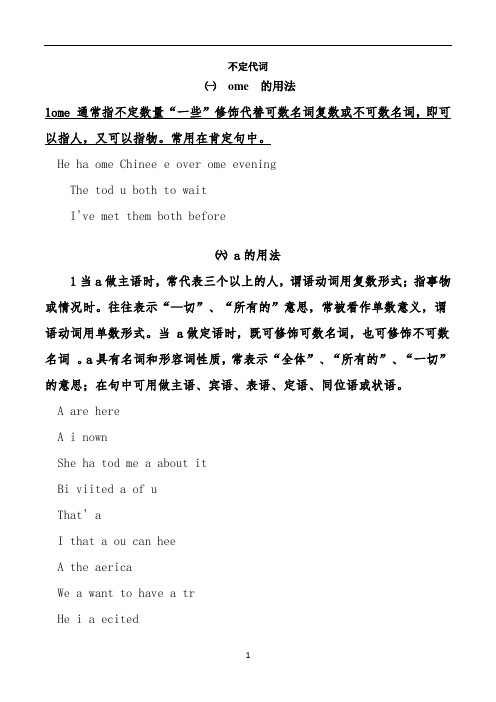
不定代词㈠ome 的用法1ome 通常指不定数量“一些”修饰代替可数名词复数或不可数名词,即可以指人,又可以指物。
常用在肯定句中。
He ha ome Chinee e over ome eveningThe tod u both to waitI've met them both before㈥ a的用法1当a做主语时,常代表三个以上的人,谓语动词用复数形式;指事物或情况时。
往往表示“—切”、“所有的”意思,常被看作单数意义,谓语动词用单数形式。
当 a做定语时,既可修饰可数名词,也可修饰不可数名词。
a具有名词和形容词性质,常表示“全体”、“所有的”、“一切”的意思;在句中可用做主语、宾语、表语、定语、同位语或状语。
A are hereA i nownShe ha tod me a about itBi viited a of uThat' aI that a ou can heeA the aericaWe a want to have a trHe i a ecitedShe wa a wet2当a用做主语时,如果后面跟有人称代词。
须在它们之间加上of;如果后面跟的是名词,它们之间可 of,也可不加。
A of them are from BeiingA of the boo are here3当a做同位语时.它在句中的位置随谓语动词而定。
当谓语动词是实义动词时,a放在动词前面;谓语动词是be时.a放在be后面;谓语是由情态动词或助动词加实义动词组成时,a放在它们之间。
The a now the anwerThe are a tudentYou can a go home4 当a 用做人称代词宾语的同位语时,a 放在宾语后面。
如 ou a, them a, u aI’ have to thin about them a again㈦ each 的用法each具有名词和形容词的性质,在句中可用做主语、定语、宾语和同位语。
七年级英语(上)语法(不定代词)
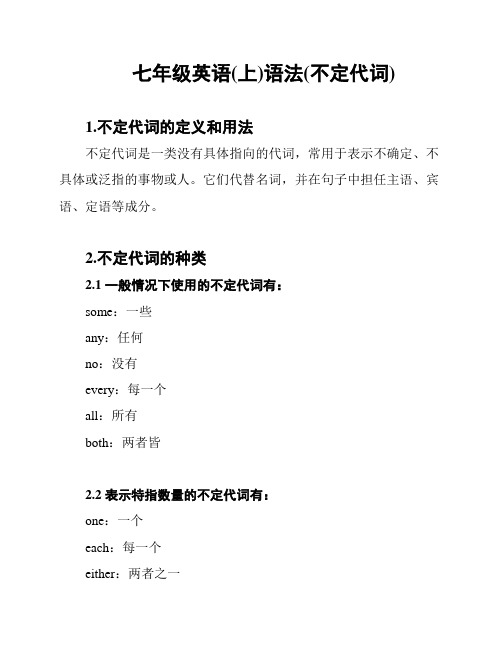
七年级英语(上)语法(不定代词)1.不定代词的定义和用法不定代词是一类没有具体指向的代词,常用于表示不确定、不具体或泛指的事物或人。
它们代替名词,并在句子中担任主语、宾语、定语等成分。
2.不定代词的种类2.1 一般情况下使用的不定代词有:some:一些any:任何no:没有every:每一个all:所有both:两者皆2.2 表示特指数量的不定代词有:one:一个each:每一个either:两者之一___:两者都不another:另一个___:足够的2.3 表示所有(无法计数)的不定代词有:much:许多many:许多___:少量的few:少量的several:几个a lot of:许多___:很多most:大多数2.4 表示某种程度或种类的不定代词有:more:更多的less:更少的another:另一个other:另一个___:这样的one:一个3.不定代词在句子中的使用不定代词可用于句子的不同位置,具体使用方式如下:作主语:Some students like sports.作宾语:I don't have any money.作定语:Each student has a book.作表语:All is well.作状语:We can go either way.4.不定代词的注意事项在使用不定代词时,需注意以下几个问题:不定代词后面通常不加冠词,例如:I want some water.(不是:I want some a water.)部分不定代词可用于可数名词和不可数名词,但意义可能会有所不同,例如:I ___(具体的几个蛋糕)vs I ate some cake.(一些蛋糕,不确定具体数量)带有否定前缀的不定代词构成否定句时,要注意应将否定词放在不定代词之前,例如:I have no money.(不是:I have money no.)以上是七年级英语(上)语法部分关于不定代词的内容。
不定代词的用法初中

不定代词的用法初中不定代词是用来代替不确定的事物或人的词语。
在初中语法学习中,一些常见的不定代词及其用法包括:1.一些(some):用于表示不确定的数量或程度。
例如,There are some books on the table.(桌子上有一些书。
)2.任何(any):用于表示无论哪一个或都可以的意思。
例如,You can choose any fruit you like.(你可以选择任何你喜欢的水果。
)3.没有人(nobody):用于表示没有任何人。
例如,Nobodyknows the answer to this question.(没有人知道这个问题的答案。
)4.所有人(everybody):用于表示所有的人。
例如,Everybody is invited to the party.(所有人都被邀请参加派对。
)5.某人(somebody):用于表示某个人。
例如,Somebodycalled for you when you were out.(你出去时有人打电话给你。
)6.这个(this)/那个(that):用于表示特指的事物或人。
例如,This is my pen.(这是我的钢笔。
)That is her bag.(那是她的包。
)7.大部分(most):用于表示大多数的意思。
例如,Moststudents like playing sports.(大部分学生喜欢运动。
)8.一些人(someone):用于表示某些人,抽象意义上的人。
例如,Someone is waiting for you at the door.(有人在门口等候你。
)通过理解和掌握这些常用的不定代词的用法,可以帮助我们更准确地表达和理解句子的意思,提高语言表达能力。
- 1、下载文档前请自行甄别文档内容的完整性,平台不提供额外的编辑、内容补充、找答案等附加服务。
- 2、"仅部分预览"的文档,不可在线预览部分如存在完整性等问题,可反馈申请退款(可完整预览的文档不适用该条件!)。
- 3、如文档侵犯您的权益,请联系客服反馈,我们会尽快为您处理(人工客服工作时间:9:00-18:30)。
关于英语不定代词的用法(1)some和any 的用法:***some一般用于肯定句中,意思是“几个”、“一些”、“某个”作定语时可修饰可数名词或不可数名词。
如:I have some work to do today. (今天我有些事情要做)They will go there some day.(他们有朝一日会去那儿)***some 用于疑问句时,表示建议、请求或希望得到肯定回答。
如:Would you like some coffee with sugar?(你要加糖的咖啡吗?)***any 一般用于疑问句或否定句中,意思是“任何一些”、“任何一个”,作定语时可修饰可数或不可数名词。
如:They didn’t have any friends here. (他们在这里没有朋友)Have you got any questions to ask?(你有问题要问吗?)***any用于肯定句时,意思是“任何的”。
Come here with any friend.(随便带什么朋友来吧。
)(2)no和none的用法:***no是形容词,只能作定语表示,意思是“没有”,修饰可数名词(单数或复数)或不可数名词。
如:There is no time left. Please hurry up.(没有时间了,请快点)/They had no reading books tolend.(他们没有阅读用书可以出借)***none只能独立使用,在句子中可作主语、宾语和表语,意思是“没有一个人(或事物)”,表示复数或单数。
如:None of them is/are in the classroom.(他们当中没有一个在教室里)I have many books, but none is interesting.(我有很多的书,但没有一本是有趣的)(3)all和both的用法:***all指三者或三者以上的人或物,用来代替或修饰可数名词;也可用来代替或修饰不可数名词。
***both指两个人或物,用来代替或修饰可数名词。
all和both在句子中作主语、宾语、表语、定语等。
如:I know all of the four British students in their school.(他们学校里四个英国学生我全认识)--Would you like this one or that one? –Both.(你要这个还是那个?两个都要。
)***all和both既可以修饰名词(all/both+(the)+名词),也可以独立使用,采用“all/both + of the +名词(复数)”的形式,其中的of可以省略。
如:All(of) (the) boys are naughty.(是男孩都调皮)(4)every和each用法:***every是形容词,只能作定语修饰单数名词,意思是“每一个”,表示整体概念;***each是形容词、代词,可用作主语、宾语、定语等,意思是“每个”或者“各个”,表示单个概念;each可以放在名词前,可以后跟of短语,与动词同时出现时要放在“be动词、助动词、情态动词”之后或者行为动词之前***every和each都用作单数理解,但是下文中既可以用单数的代词(如he/him/his)也可以用复数的代词(如they/them/their)替代。
如:Everyone of the students in his class studies very hard.(他班上每个学生学习都很用功)They are very busy. Each of them has something to do.(他们很忙,人人都有事干)(5)either和neither的用法:***either意思是“两个中间的任何一个”;***neither是either的否定形式,意思是“两个都不”。
***neither和either在句子中可作主语、宾语和定语等,都用作单数。
如:Either of the two will do.(我不介意喝些什么,两个之中随便哪个都行) /--Will you go there bybus or by car?–Neither. I will go there by train.(你坐公车去还是坐轿车去?一个都不坐,我坐火车去。
)(6)other、the other和another的用法:***other意思是“另一”、“另一些”,有复数形式。
在句子中可作主语、宾语和定语。
***another意思是“另外”、“又一个”,表示增加,在句中可作宾语和定语。
如:Some girls are singing under the bigapple tree and others are sitting on the grass talking.You have had several cakes.Do you really want another one?I want another four books.***another(另外的,再一,又一)与the other(另外的一个)主要从数量上区分,只有两个时用the other,在原先基础上增加用another。
如:This is one of your socks.Where is the other one?I have eaten 4 cakes, but I still want another.***others与the others的主要区别:***others指“剩余的人/物”(指大部分);***the others指“其余的人/物”,(指全部)。
如:A few students are playing soccer while others are watching them.Two of the ten boys are standing and the others are sitting round them. (7)many和much的用法:(7) many 和much:***many意思是“很多”,与可数名词复数连用;***much意思是“很多”,与不可数名词连用。
它们在句中可作主语、宾语和定语等。
如:I don’t have many friends here.(在这里我没有很多的朋友。
)Many died in the bus accident.(许多人在公交车祸中丧失)We can learn much with the help of him.(在他的帮助之下我们能学到很多)***many和much一般用于否定句,肯定句中通常用a lot of或者lots of;***many / much用于肯定句时可以在前面加上so、very或too.如:There are a lot of people on the playground.(操场上有许多的人)/They haven’t got much work to do.(他们没有多少事情可做)There are too many people in the room.(房间里人太多了。
)(8)few、little、a few、a little的用法:***few、little意思是“很少几个”、“几乎没有”,有否定的意思,***a few、a little意思是“有几个”、“有些”,有肯定的意思;***few、a few与可数名词连用或代替可数的事物,little、a little与不可数名词连用或代替不可数的事物。
它们在句中可作主语、宾语和定语。
如:He is very poor and he has little money.(他很穷,几乎没有什么钱。
)Don’t worry. There is still a little time left.(别着急,还有一点儿时间呢。
)In that polar region there live few people.(在那个极地地区几乎不住人)You can get a few sweets from him.(你可以从他那儿弄到一些糖果)(9)复合不定代词somebody ,something ,anything, nothing ,everything, everybody等是由some , any ,no ,every, 加上body, thing构成的,叫做复合不定代词,在句子中当单数使用。
复合不定代词有12个:something(某事), someone(某人), somebody(某人),anything(任何事), anyone(任何人), anybody(任何人),nothing(没事), nobody(没有人), no one(没有人),everything(一切), everyone(每个人), everybody(每个人).***somebody, something, someone 一般用于肯定句中;***anything, anybody, anyone一般用于疑问句、否定句和条件状语从句中。
修饰复合不定代词的定语,应放在它们的后面。
如:Hey, Lily. There is someone outside the door.Did you meet anyone when you came to school last Sunday?He has nothing much to do today.(10)one与ones用来代替上文的一个或多个人或事物,前面可以加冠词、形容词、指示代词、which等。
如:Which jacket would you like, this one or that one?(你要哪件夹克,这件还是那件?I don’t like the green ones.(我不喜欢绿色的那些)(11)so可以代替一件事情,作句子的宾语或表语。
如:I don’t think so.(我认为不是这样的。
)He lost a book. So did I.(他丢失了一本书,我也是。
)(12)a lot of、lots of、a number of( /large numbers of)、a great deal of、plenty of 的区别:五个“名词+介词”短语都表示“大量,许多”,a lotof(或lots of)既可以修饰不可数名词也可以修饰可数名词的复数形式,可以相应地换为much和many;plenty of“足够、大量”,既可以修饰不可数名词也可以修饰可数名词的复数形式。
a number of / large numbers of只可以修饰可数名词复数形式(它修饰的词作主语时谓语用复数形式)可以换为some、many、a lot of、plenty of。
